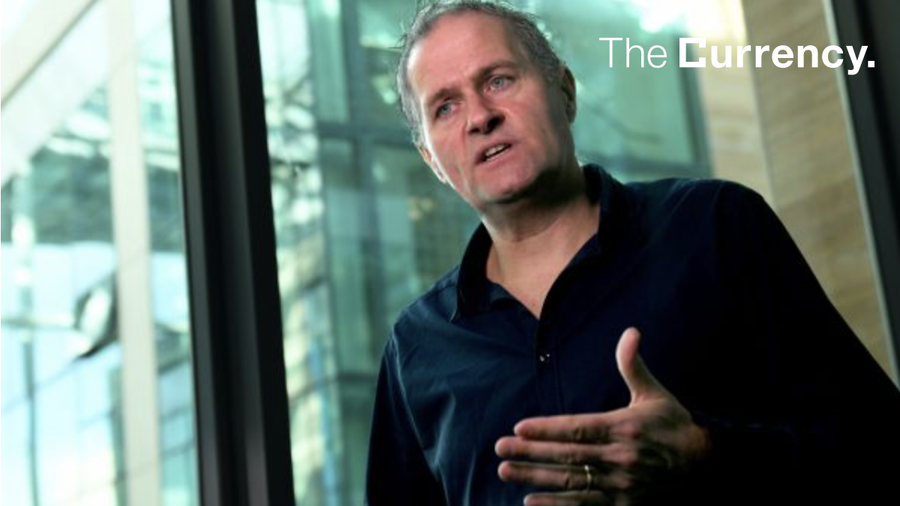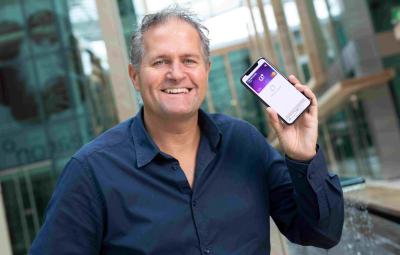On the road again: Kealan Lennon has reached CleverCards’ moment of scalability and is on the hunt for investors
 Kealan Lennon, founder and chief executive of CleverCards. Pic. Bryan Meade
Kealan Lennon, founder and chief executive of CleverCards. Pic. Bryan MeadeView original article at The Currency
With the global horsepower of Mastercard as its payments partner, CleverCards may be about to hit its stride. Its founder talks about raising €25m, geographic expansion, and Stripe.
Kealan Lennon’s mot de jour is “scale”. He uses it more than thirty times in a sit-down interview with The Currency about his plans to raise €25 million for CleverCards, the business he founded in 2011.
Lennon is raising from private and institutional investors almost a year ahead of schedule, as he says the business’s infrastructure is now robust enough to grow its client base infinitely.
Using the aspired-to €25 million in capital, the business is planning a geographic expansion to the UK, Italy and Spain. It is also planning on increasing headcount from 35 to 75 by the end of the year.
Having pivoted from greeting cards to prepaid debit cards, CleverCards allows companies to send digital cards via email or text message.
Customers include professional services firms, law firms, and banks. The cards can be tightly customised to be used with specific businesses and in a certain time frame, nifty elements which are now bringing in opportunities with governments wanting to target social welfare subsidies to specific citizens.
The company has also secured a partnership with Mastercard, embedding its technology with the payments processor’s global network.
Now, after three years of development and many delays, Lennon is confident that his investment proposition – a profitable company, with low costs, a judicious approach to finance, and some big names already on the term sheet – will prove a greater draw than the contractions the market is currently facing.
The Smurfit family and Eoghan Quigley, a partner in KPMG and investor in Global Shares, the Cork firm that was sold to JPMorgan for €665 million last year, are already lined up for the next round. As well as previous backers from the company’s €10 million raise in 2021; Delta Partners and Enterprise Ireland, Gareth Lambe the former head of Facebook Ireland, and Pat Gunne, the property entrepreneur.
The indication that now is the right moment to target serious growth came in the last eight weeks of 2022 when CleverCards added 100,000 new accounts, and its revenue was 50x on the year previous.
“It just shows what we can do. We are now profitable on every single order,” Lennon said. “I think that’s going to bode very well, we’re raising capital, we’re accelerating.”
Around 20 per cent of the raise will be reserved for private investors and Lennon hopes by bringing in high-net-worth individuals with credibility early on, the next phase of the raise will be well-oiled.
Lennon, who is doing the handshakes and outreach himself with an eye to involving an investment bank later in the year, has already been approached by two chief executives of “very large FinTech global players,” who have confirmed that they want to invest in the round.
“Flight to quality”
While start-ups who raised in the swashbuckling era of 2020 and 2021 may now face the vexing task of raising money in a down round, Lennon sees a “flight to quality” on the horizon for businesses that have scalable digital business models and are run by teams with a “prudent and judicious” approach to the use of invested capital.
It’s the difference, in his view, between those companies forking out for parties and big stands at tech conferences and those who are fighting for a discount wherever they go, focusing on profitable unit economics.
“The beauty of CleverCards is that we are not carrying a $2 billion valuation, we didn’t raise $200 million, we didn’t blow the money. So we’re in a very, very solid position,” he said.
“A lot of these companies grew for the sake of growth as distinct from proper profitable underlying metrics. Now they’re all doing redundancies and clawbacks. We’ve invested less than €10 million in the business to date. That means it took a little bit longer, but it’s built now and there is no cost to scale.”
But while the company didn’t raise millions at a tremendous valuation, it did try. In May 2021, Lennon spoke to The Currency about his plans to raise €50 million.
But the plans never materialised and Lennon says they didn’t need to raise that money in a “roaring hot” market in the end.
“We decided to hold off and we didn’t engage seriously with many VCs. We felt we would drive a far higher valuation by holding off and raising later,” he said.
“Now we look like heroes because we have been focused on profitable economics, unlike most FinTechs.”
“Long burn”
During the interview, Lennon mentions a partnership with the British government where digital cards are being issued to citizens and the credit on them can only be used as payment with the 26 utility providers available in the UK. The project gets to the heart of CleverCards capabilities for customisation and configuration.
“Rather than an employee benefit they were for a social welfare benefit or citizen benefit, it’s the same concept,” Lennon said.
“No other bank can do that. It’s because we are the entire stack. We’re issuing the card and with the payment processor, we can delegate and enable that configuration to the business.
“Imagine a business going to a bank, or going to SAP to say; Could I get a card that only works in utility providers with cards that expire next month? Or next year? Nobody else can do it.”
Lennon, who was at Davos last month with the Minister for Finance, among others, has already raised the possibility with the government and describes the reaction as a “long burn”.
“Giving people digital payments brings financial inclusion,” Lennon said.
“We are still one of the only countries in the world where it’s cash in the post office etc. And that generally brings a greater degree of social welfare fraud.
“With a digital card, there comes control and visibility and everything else that comes with that. I think it will happen in due course, but it needs the will of the government and it needs the post offices to be involved.”
After the issue with the universal energy credits, which have now gone to every household in Ireland regardless of their status as primary residences or holiday homes, there are clear advantages to a system like CleverCards brings in being able to target specific groups of people and apply credit for use at restricted locations or businesses.
“Frankly, game on Stripe”
Asked about the proposition of Stripe and its current fortunes – it burned through $500 million in cash last year as revenue growth fell sharply, according to recent reporting in The Information – Lennon is both complimentary and competitive.
“In my assessment, what sets Stripe apart from its competitors is its commitment to investing and developing for the future,” he said.
“CleverCards is a payment processor, like Stripe. But we didn’t have billions to invest, unlike Stripe. And so my tact was; I’m going to see if MasterCard would give me their processor and then embed inside that infrastructure.
“It’s great to be able to associate ourselves with Stripe, but quite frankly, it’s really MasterCard that is the core of payments processing. So, game on Stripe right?”
Right now for Lennon, it’s about growing the business vertiginously: “2023 is promising to be a really bumper year for us because we can now scale it out. If we get a request to issue 300,000 digital cards we can now do that just as easily as 3000,” he said.
“Who knows, maybe down the road it is an IPO candidate, who knows, but for now the focus is on growing and now that we’ve got the infrastructure built it’s about scaling it out.”


